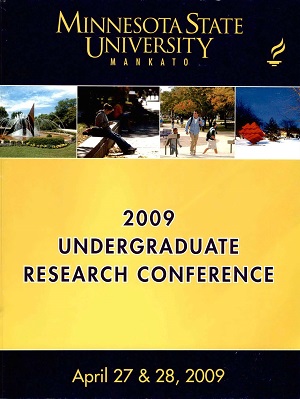The Effect of Red Bull Energy Drink on Attenuating Muscular Fatigue Following Heavy Exercise
Location
CSU Ballroom
Start Date
27-4-2009 1:00 PM
End Date
27-4-2009 3:00 PM
Student's Major
Human Performance
Student's College
Allied Health and Nursing
Mentor's Name
Robert Pettitt
Mentor's Department
Human Performance
Mentor's College
Allied Health and Nursing
Description
Red Bull® (RB) is marketed to help people sustain muscular performance. Most research has been confined to exploring the effects of caffeine and not some of the other "active" ingredients (e.g., taurine). Purpose: This study investigated the degree to which muscular power was maintained following heavy exercise in which subjects consumed either RB or Control (CTRL) drink containing the same concentration of caffeine. Methods: The study was a double-blind, randomized, crossover design. Eight recreationally-trained cyclists completed a graded exercise test to determine power evoking the gas exchange threshold (GET). For each bout, subjects pedaled on an electronically-braked cycle ergometer at an intensity equivalent to the power evoking the GET for 20-min. Digital video was captured for 3 vertical jumps prior to and following the cycling bouts. Knee joint angle was digitized for each frame to obtain joint velocity. The total hip joint displacement and gravitational force on the body was used to derive linear power. These data will be evaluated statistically and the results will be presented.
The Effect of Red Bull Energy Drink on Attenuating Muscular Fatigue Following Heavy Exercise
CSU Ballroom
Red Bull® (RB) is marketed to help people sustain muscular performance. Most research has been confined to exploring the effects of caffeine and not some of the other "active" ingredients (e.g., taurine). Purpose: This study investigated the degree to which muscular power was maintained following heavy exercise in which subjects consumed either RB or Control (CTRL) drink containing the same concentration of caffeine. Methods: The study was a double-blind, randomized, crossover design. Eight recreationally-trained cyclists completed a graded exercise test to determine power evoking the gas exchange threshold (GET). For each bout, subjects pedaled on an electronically-braked cycle ergometer at an intensity equivalent to the power evoking the GET for 20-min. Digital video was captured for 3 vertical jumps prior to and following the cycling bouts. Knee joint angle was digitized for each frame to obtain joint velocity. The total hip joint displacement and gravitational force on the body was used to derive linear power. These data will be evaluated statistically and the results will be presented.
Recommended Citation
Lipetzky, Amanda. "The Effect of Red Bull Energy Drink on Attenuating Muscular Fatigue Following Heavy Exercise." Undergraduate Research Symposium, Mankato, MN, April 27, 2009.
https://cornerstone.lib.mnsu.edu/urs/2009/poster-session-B/6




